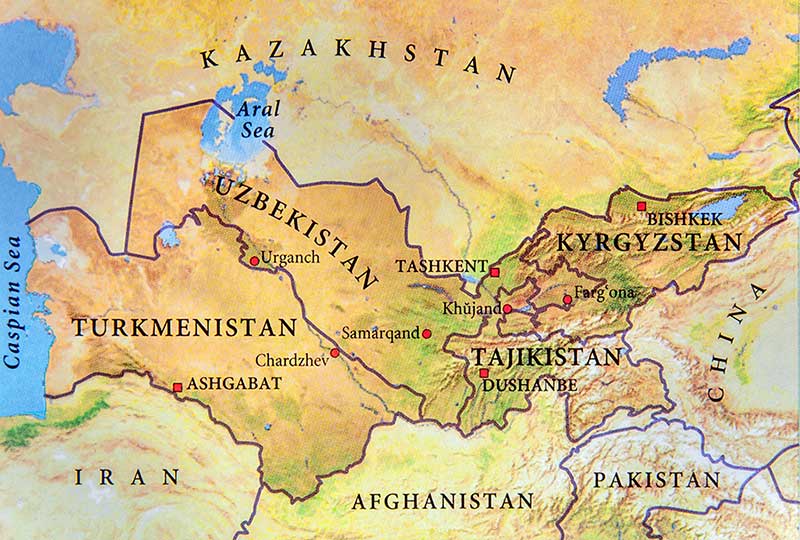Kyrgyzstan, Tajikistan Foreign Ministers Discuss Increasing Trade, Infrastructure Connectivity
The Foreign Ministers Kyrgyzstan, Ruslan Kazakbaev and Tajikistan’s Sirodjiddin Mukhriddin held a virtual conference today to discuss current issues of Kyrgyz-Tajik cooperation, regional security issues and the prospects for further cooperation.
The two countries are neighbors, with some territorial disputes, although trade development and increasing participation with China’s Belt and Road Initiative has been switching the bilateral relations to a more productive footing. Both are ex-Soviet nations, with close ties to both Moscow and Beijing.
Kazakbaev and Mukhriddin agreed on the need to continue work on confidence-building measures along their respective state borders and to reach agreement on disputed sections. In addition, they exchanged views on upcoming foreign policy events within the framework of the Fourth Consultative Meeting of the Heads of State of Central Asia, as well as the planned high-level meeting in Kyrgyzstan’s capital city Bishkek, marking “30 Years of cooperation of Central Asia-OSCE” being held
The Organisation of Security & Cooperation In Europe (OSCE) is the world’s largest regional security-oriented intergovernmental organization with observer status at the United Nations. Its mandate includes issues such as arms control, promotion of human rights, freedom of the press, and free and fair elections. It employs around 3,460 people, mostly in its field operations but also in its secretariat in Vienna, Austria, and its institutions.
The OSCE is concerned with early warning, conflict prevention, crisis management, and post-conflict rehabilitation. Most of its 57 participating countries are in Europe, but there are a few members present in Asia and North America. The participating states cover much of the land area of the Northern Hemisphere. It was created during the Cold War era as a forum for discussion between the Western Bloc and Eastern Bloc. The upcoming Bishkek meeting will be a chance for Central Asian nations to seek assistance for settling down Afghanistan, as well as to show off improvements in human rights issues, all linked to potential EU grants and loans. Neither Kyrgyzstan nor Tajikistan will want any border disputes on the agenda while they concentrate on wooing the EU.
Kyrgyz-Tajik bilateral trade volumes are relatively small, the mutual regional terrain being mountainous, high altitude, and difficult to navigate. In 2020, Kyrgyzstan exported goods to the value of US$11.2 million to Tajikistan, while export trade between Tajikistan to Kyrgyzstan reached US$5.53 million. Kyrgyzstan exports are mainly refined petroleum, plastics, and glassware, while Tajikistan exports mainly cement, cotton, and electricity.

Kyrgyzstan is a member of the Eurasian Economic Union (EAEU), a free trade bloc that also includes Armenia, Belarus, Kazakhstan and Russia, while both Kyrgyzstan and Tajikistan are members of the Commonwealth of Independent States, which also includes Azerbaijan, Moldova, and Uzbekistan. CIS members negotiate bilateral trade agreements between themselves. Both are also members of the regional Shanghai Cooperation Organisation which provides a security and trade platform alongside regional heavyweights such as China, India, Iran, Pakistan and Russia.
Both countries however could have their relative isolation improved via the Belt and Road Initiative, although both have partially nomadic populations resistant to such changes. A major issue and long-standing question is rail connectivity through with China, and onto to Uzbekistan via the Ferghana Valley. Many variations of such a railway line have been proposed, none have yet got off the drawing board due to the sheer expense. Such a route would ultimately provide links for Kyrgyzstan and Tajikistan both to the huge Chinese market, and also to other Central Asian markets, and routes connecting via the INSTC to the middle east and Europe.
That said, Kyrgyzstan’s foreign trade volumes were up nearly 20% last year, while Tajikistan’s trade volumes rose significantly from US$4.56 billion in 2020 to US$6.4 billion in 2021.
China, Kazakhstan and Russia all remain significant markets for both, with the prospect of additional Russian investment finance entering these markets as the country looks East for opportunities in the wake of EU sanctions.
Related Reading
About Us
Chris Devonshire-Ellis is the Chairman of Dezan Shira & Associates. The firm assists British and Foreign Investment into Asia and has 28 offices throughout China, India, the ASEAN nations and Russia. For strategic and business intelligence concerning China’s Belt & Road Initiative please email silkroad@dezshira.com or visit us at www.dezshira.com





